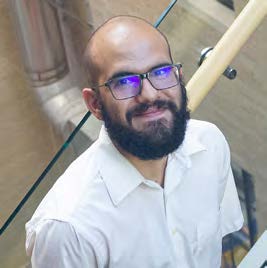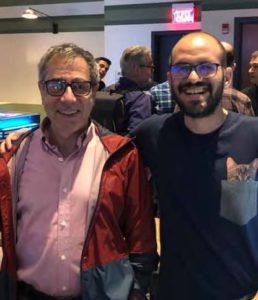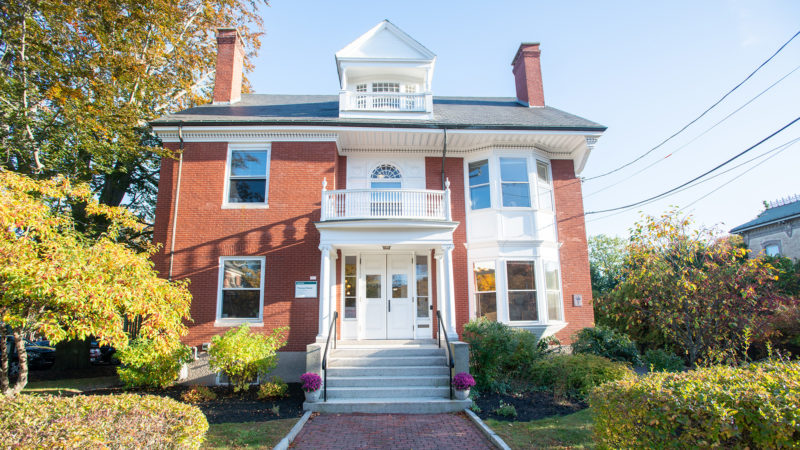Exploring the world of condensed matter theory with Ali Ghorashi ’15
Power up your stereo receiver, game system, or desktop computer. Wait a few minutes, then place your hand on the top panel. Feel the warmth? That’s waste heat, the result of the inefficient conduction of electricity. Multiply that effect by the billions of residential, commercial, and industrial devices and machines in use around the world and you’ll start to get a sense of how much generated power is lost as heat—and the resulting effect of that waste heat on global warming.
But don’t fret. Change is coming, and Ali Ghorashi ’15 is part of the team that’s on the case.
 Ali grew up in a household filled with science. As an elementary school student, he remembers spending hours poring over the latest issue of Popular Science magazine. “I couldn’t understand a lot of the material at that age,” he recalls. “But I was definitely intrigued.” As Ali got older, his interest deepened. He was also starting to learn more about—and appreciate—his father’s working life as a mechanical engineering professor at the University of Southern Maine.
Ali grew up in a household filled with science. As an elementary school student, he remembers spending hours poring over the latest issue of Popular Science magazine. “I couldn’t understand a lot of the material at that age,” he recalls. “But I was definitely intrigued.” As Ali got older, his interest deepened. He was also starting to learn more about—and appreciate—his father’s working life as a mechanical engineering professor at the University of Southern Maine.
As a new ninth-grader in Waynflete’s Upper School, Ali became immersed in all things jazz (four years later, his senior project would focus on the transcription of jazz pieces). But science quickly became the center of his school experience. He distinguished himself by participating in the Science Bowl as a freshman, a year in which the team won an unexpected second place in the state competition. “This was the start of an exciting time for science at Waynflete,” science teacher Wendy Curtis recalls. “This crew of kids was fired up and ready for more.”
Ali also joined the Science Olympiad team as a freshman. Whether you were interested in hands-on activities like building robot arms or in the more abstract work found in the form of challenging tests, there was something for everyone in these competitions. Ali helped the team secure the state title in his sophomore year. The squad went on to compete at the national level three times during Ali’s years in the Upper School.
Ali teamed up with Sophie Benson ’14 to participate in “MEST Up,” a STEM-focused TV show that ran for several years in Maine. The pair won the competition in Ali’s junior year. “We were starting to see that if we were willing to invest time, there could be significant results,” he recalls. “That was one of my big takeaways from my time at Waynflete.”
Throughout his years in the Upper School, Ali was encouraged by teachers to try things out and take risks. “We experimented a lot, and that was really because we were interested in just seeing what could happen,” he says. “We were always shooting for the highest possible outcome, even if things didn’t always pan out. We wanted to take risks rather than play it safe.” Teacher Wendy Curtis recalls Ali firing rocket motor-propelled cars across labs tables and attempting to light a fluorescent bulb with a Van de Graaff generator. Her recollection of him is captured with a simple description: he was an experimentalist.
As the college application process began, Ali was challenged to choose one of two paths: mathematics or physics. The deciding factor was a series of conversations he had with physics professors at the University of Pennsylvania. “All the physicists I talked to seemed to approach problems in a way that was more natural for me than mathematics,” he says. “I later learned that in his undergraduate years, my advisor had been intrigued by the same kinds of questions that were on my mind at the time.”
Ali quickly immersed himself in research at Penn—work that he hoped would help him determine which field of physics to specialize in. He joined teams that were developing carbon nanotubes to detect cancer and worked on materials synthesis projects. While Ali eventually decided to pursue theoretical physics, he also wanted to ensure that his future research would still be tied to material science and chemistry. “I wanted my work to be experimentally viable,” he says. “I wanted there to be results that I could actually see in a lab.”
In 2018, Ali was one of five Penn students selected to receive the Roy and Diana Vagelos Challenge Award, whose goal is “to reward the very best, motivated, and advanced science students, and to challenge them to get the most from themselves.” In his senior year, he was recognized with the William E. Stephens Award for best graduating undergrad in physics.
Ali also won a National Science Foundation Research Fellowship. He credits Waynflete’s emphasis on writing across the curriculum for his success with this application. “It’s critical to be able to communicate your ideas in written form to the individuals who make funding decisions,” he says. “My writing experience at Waynflete was instrumental in helping me submit a convincing application.”
 Feeling the call of academia, Ali began to consider schools where he could begin working toward his PhD. Though Harvard was eager to have him join its program, he selected MIT, drawn by the close working ties between that school and the University of Pennsylvania. “Both institutions were working on just the kinds of problems that I’m interested in,” says Ali. (Ali’s PhD advisor at MIT had, in fact, completed his own PhD work at Penn with Ali’s former advisors.)
Feeling the call of academia, Ali began to consider schools where he could begin working toward his PhD. Though Harvard was eager to have him join its program, he selected MIT, drawn by the close working ties between that school and the University of Pennsylvania. “Both institutions were working on just the kinds of problems that I’m interested in,” says Ali. (Ali’s PhD advisor at MIT had, in fact, completed his own PhD work at Penn with Ali’s former advisors.)
Ali’s current research focuses on condensed matter theory, a field that has expanded significantly in recent years. Condensed matter systems work with huge numbers of particles whose properties are difficult to measure in labs, such as the transition that materials undergo due to temperature changes (transforming from solids to liquids or from a superconducting to a nonsuperconducting state, for example). Conductivity, which is usually easy to measure, is actually difficult to predict theoretically with certain materials. Biological condensed matter studies may include predicting how molecules diffuse in liquid.
These problems have a massive number of “degrees of freedom.” The challenge is to know which degrees of freedom can be disregarded in the quest to solve problems in a reasonable time frame. Historically, these simplifications have helped researchers successfully predict condensed matter phenomena. But Ali has recently been involved with research that reintroduces previously disregarded degrees of freedom to more accurately study condensed matter behavior.
Practical implications
Ali is specifically interested in learning why some materials are superconductors—that is, they conduct electrical current with virtually zero resistance at high temperatures. He is also seeking to learn why some materials strongly react nonlinearly with electric fields. “While we have observed these behaviors, we don’t have theories that explain them,” he says. “It’s an exciting time right now, with many experiments underway. Our goal is to move as much theory as we can from the ‘no certainty’ bucket to the ‘near certainty’ bucket.”
Ali’s research has practical implications in the area of energy consumption. Much of the energy consumed by modern electronic devices is lost unnecessarily as heat. If materials can be engineered to conduct electricity more efficiently, less energy is lost. More efficient electronics means a reduced need for energy production, which could have a positive effect on climate change.
Ali is also working on projects related to quantum computing, an area that is rapidly moving from theory to practical design. Quantum computers make calculations using algorithms that would take far too long to run on classical computers. Ali’s team is helping to create an architecture upon which quantum computer researchers can build their devices. “This work will open a whole new spectrum of computing possibilities,” he says.
Ali has recently begun settling into his new community in Cambridge. Taking a moment to reflect on his time at Waynflete and the decisions that led him to where he is today, he returned to the concept of risk-taking. In his undergraduate years, Ali frequently switched between research groups—in spite of risk that these changes might look bad on his resume or graduate school applications. “Students often worry that they need to figure out that ‘one cohesive goal’ in their undergraduate years, and that without it, they will be penalized. No one will want to hire them, and they won’t be accepted to graduate schools,” he says. “It’s just not true. Being an undergrad is all about figuring out what you want to do. It’s so much better to try out different things in your teens and twenties than it is to get stuck prematurely in something. Young people shouldn’t feel pressure to know with certainty what they want to do until they’ve done some exploring.”



